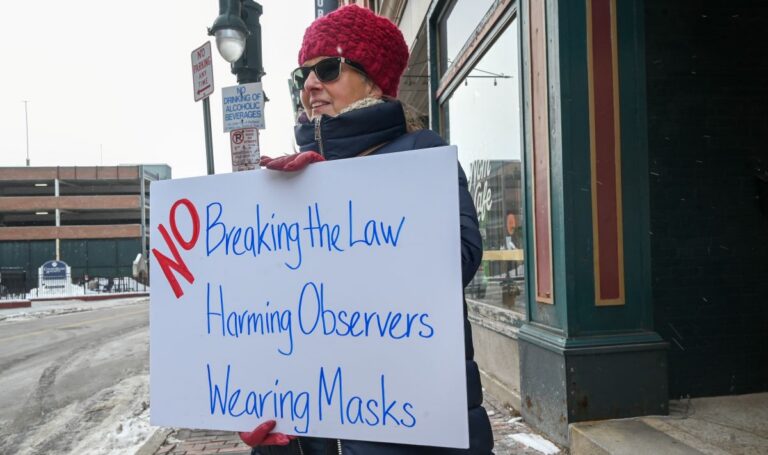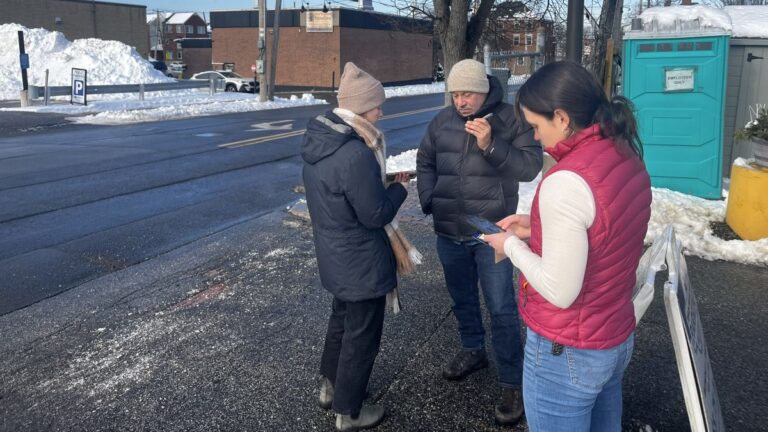Dead men don’t vote. And they can’t sign their names to voter petitions, either.
But one did in the town of Greene last year.
A name of a deceased town resident was one of the signatures the alert town clerk found on a petition asking voters if they wanted the tax reform bill to go to a people’s veto referendum in June.
The clerk discovered that every signature on the petition was invalid. The state legislator who represents the town says the attorney general’s office is considering prosecuting the case.
It’s wasn’t the first time a dead person’s name was found a referendum petition. About four years ago, a Northport woman was sentenced to 45 days in jail for forging more than 300 signatures — including a deceased Winslow resident’s name — on a gambling petition.
In both cases, the signature gatherers were not volunteers who believed in the cause. For them it was just a job — making a dollar or two per signature.
These incidents have called attention to the increasing role money is playing in a process that was designed 100 years ago to give everyday citizens a way to bypass their elected officials by bringing an issue directly to the voters.
Critics of the paid signature business say it is not only contrary to the grassroots intent of the citizen initiative movement, it also motivates some signature gathers to cheat their way to a quick pay day.
While defenders of the process say fraud represents only a small part of the total signatures gathered, people on both sides of the issue acknowledge it has become big business.
At the request of the Maine Center for Public Interest Reporting, the Maine Commission of Governmental Ethics and Election Practices calculated the total amount of money spent on signature gathering between 2006-2009 on issues from tax reduction to gay marriage.
The total was $1,660,000.
Of that, nearly $1.2 million went to one California firm to gather signatures for groups pushing three ballot questions: vetoing same sex marriage, which was successful last year, and approving a casino in Oxford County and defeating the tax legislation, both of which will be on the June ballot.
Generally, according to public officials and those in the signature collecting business, the pay is anywhere between 50 cents to $2 per signature.
Concerns about the influence of paid signature gathers has promoted two Democratic state legislators to file bills to require more transparency and accountability.
“The current system gives incentives to lie and cheat,” said the sponsor of one of those bills, state Rep. Seth Berry, D-Bowdoinham “We need to do something about some of these fly-by-night companies.”
In his study of the citizen initiative process titled “Democracy Derailed,” syndicated columnist David Broder quotes David Frohnmayer, president of the University of Oregon, a state that also allows initiatives: “It’s no longer citizens fighting the oligopoly. Now it’s the oligopoly paying people to act as citizens.”
“Something fishy”
Sally Hebert has been the town clerk in Greene for 22 years and lived there all her life. When a woman who had been paid $1 a signature to gather names submitted the petition, Hebert did what she always does — she reviewed the list to confirm if the people who signed are registered voters.
The first problem she spotted was a signature of a woman she knew — she even knew her handwriting. “It just didn’t match,” Hebert said.
So she called the woman who had supposedly signed the petition.
“She told me she didn’t sign anything like that,” Hebert said.
That made Hebert more suspicious so she checked every signature on the petition against the town’s voter rolls.
“They were all false,” she said. “One was even deceased.”
She told the secretary of state’s office and, according to the state senator who represents Greene, Democrat John Nutting, the matter is under review for possible prosecution by the state attorney general. A spokesperson for that office said she could neither confirm nor deny that the matter has been referred to the AG.
The woman who collected the Greene signatures and has not been identified was hired by an Auburn man who runs a political consulting business, former Republican legislator Stavros Mendros.
Mendros said had heard from a friend about “something fishy going on” and he, also, called the secretary of state about the woman.
This wasn’t the first time Mendros’ consulting operation has run into trouble: In 2007, he pled guilty to three counts of falsely notarizing the signatures of petition circulators on pro-gambling petitions and was fined $2,000.
The Greene incident resembles a December 2005 case that involved forged signatures in a dozen Maine communities.
Amanda Arsenault, 22 at the time, was hired to get signatures on the tribal gambling petition. Instead, she forged more than 300 names — and, again, at least one of them was a dead person.
The town clerk in Winslow had spotted the name of a deceased resident on one of the petitions and the city clerk in Augusta also noticed irregularities.
“The first hint I had,” recalled Augusta clerk Barbara Wardwell, “was seeing the name Mary Mayo of the petition. She always signs her name as Mary Mayo-Wescott.”
Mayo-Wescott said, “I went right down there to see it and it wasn’t even the way I sign my name.”
“I was appalled, and I was shocked,” she said.
Names from the phonebook
That prompted Wardwell to check all five pages of the petitions submitted by Arsenault. One of the odd things she noticed is that some signers had abbreviated their first names: “Geo” for George and “Robt” for Robert, for example.
“That’s the way these names often show up in the phone book,” she said. “Then it dawned on me — all of these are from the phone book.”
The Winslow businessman who hired Arsenault confirmed that suspicion.
Peter Martin had been hired by the Washington County slot machine supporters to help gather the necessary 55,000 signatures to place the issue on the ballot, which voters rejected in 2007.
“The Winslow clerk called and said something doesn’t look right.”
When Martin examined the petitions, “I could tell she has used a practice known as ’round-tabling.’ They sit around a table and pass around the phone book and copy names out of it.”
Martin said he had already paid her about $2,000, but he withdrew the bad petitions and notified the secretary of state.
Arsenault pled guilty in Kennebec Superior Court to aggravated forgery and was sentenced to 45 days in jail.
Assistant Attorney General Leanne Robbin handled the case.
“She wasn’t a zealot about the petition. She just wanted the 50 cents or two bucks per signature,” Robbin said. “Absolutely, her only motive was to get paid.”
‘Hawking’ for signatures
In 1994, the Maine Legislature was so concerned about the effect of per-head signature gathering on the integrity of the process that it passed a ban on the practice, while still allowing gatherers to be paid by the hour, for example.
“The whole thing gave me the complete total shivers,” said Marge Kilkelly, who sponsored the bill when she was in the legislature representing the Wiscasset area.
“I really do believe that signing a petition to put an issue of the ballot is just as sacred as voting … It felt to me that people were just out there hawking for your signature, not because they believe in the cause, but because it would make them some money.” she said.
Signing a petition, Kilkelly said, is, in effect, “voting to vote.” And when money changes hands in that process “to me, it’s like being paid to vote.”
But the law was struck down in federal district court based upon the argument that the law was not “consistent with the First Amendment” and might hinder the citizen initiative process. But the court also suggested it might have ruled otherwise of the state had presented any evidence of actual fraud.
Those concerns were not enough for the court to uphold the ban, partly because, “To the secretary’s knowledge, no petition circulator in Maine who has been paid per signature as been prosecuted for forgery in connection with signature gathering.”
But North Dakota was able to have a similar law upheld by the federal courts in 2001. That law prohibited paying per signature and required circulators to be state residents.
The court ruled that “these two regulations are designed to protect the integrity of signature gathering.”
North Dakota’s case was made stronger because, unlike Maine 10 years ago, it was able to cite at least one example of fraud: 17,000 invalidated signatures, some of which had been gathered by paid workers from Utah.
That state’s law, the court said, ensures that a ballot issue “has grassroots support in North Dakota and that the initiative process is not completely taken over by moneyed interests and out of state special interest groups.”
John Bjorson, of North Dakota’s attorney general’s office, said many of those bad signatures that led the court to upholding his state’s law were — like the forgeries in Maine — “made up — they were taken right from the phone book.”
In Maine, petitions are certified by the secretary of state, an office currently held by Democrat Matthew Dunlap. Dunlap acknowledged that the pay-per-signature approach “raises fears that it encourages people to game the system, to take out the phone book and pass it around.”
A system will soon be in place at his office to electronically match signatures on petitions with signature cards, but he added that “a good forgery would be hard to detect.”
‘A sacred process’
The first citizen’s initiative in Maine was on the 1911 ballot. It asked voters to approve primary elections for political parties and passed by more than 2 to 1.
In the next 60 years, only six more issues made it to the Maine ballot based in signature gathering petitions. There were none at all in the 1950s and 60s.
Government-by-referendum was hardly a general topic before California voter approved a tax rollback known as Proposition 13 in 1978.
Maine started getting into the act in the 1970s and 80s, also. But the process has been especially active in the last 20 years — producing 32 ballot questions, while there were only 24 in the first 80 years of the Maine’s version of direct democracy.
Three are scheduled for this June: reversing the law that lowered the state income tax and broadened the sales tax; the Oxford County casino; and banning fluoride in public water supplies.
The first two got on the ballot with the substantial help of paid signature gatherers who used an out of state professional firm.
It all strikes Mayo-Wescott, the former city councilor whose name was forged, as contrary to the spirit of voting.
“I believe in the people’s right to petition,” she said. “I worked on a petition drive myself in the past, and it’s really hard work to get those names, but it’s supposed to be because its a sacred process, and it should be done correctly. They should never be paid for it. It’s been abused and overused.”







